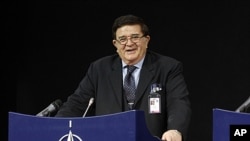At a meeting in Brussels Thursday, the foreign ministers from the NATO-led coalition in Afghanistan renewed their commitments to continue supporting the country's government and security forces during and after the transition to full Afghan control, scheduled to be completed two-and-a-half years from now.
Afghanistan's defense minister, Abdul Rahim Wardak, called this “a critical juncture and a defining moment” for his war-ravaged country. He said international commitments of continuing support - to be finalized at the NATO summit next month - will reassure Afghans about their future security and send a message to insurgent groups that they can not wait out the foreign presence and must negotiate a settlement.
Wardak said this week's dramatic Taliban attacks exposed some weaknesses in intelligence gathering, but overall he defended the performance of the Afghan forces. “Based on all the analysis, I think everybody is of the opinion that the Afghan National Security Forces performed very, very well, which was a demonstration of their improved capacity and also coordination," he said. "And also that the investment of the international community was worth it.”
Wardak also justified his government's request for $4 billion in annual international funding for its security forces after most foreign forces leave in 2014. He said for all the attention the figure is getting, it is much lower than the $150 billion foreign countries are spending now to have their own troops in Afghanistan.
NATO Secretary-General Anders Fogh Rasmussen says the NATO Summit in Chicago will include 32 non-NATO countries and international organizations, which he said is evidence of a global commitment to Afghanistan's future.
But Russia may not be there. After meeting NATO ministers Thursday, Russian Foreign Minister Sergei Lavrov said his country wants to be in all NATO discussions with its non-NATO partners about Afghanistan because Russia provides important transport links for the effort. He indicated that without such a guarantee - which Secretary-General Rasmussen was not prepared to give - Russia may decide not to participate in what Lavrov called “the festivities” in Chicago. He also criticized NATO's Afghan transition timeline, saying that adhering to it could leave an unstable Afghanistan behind.
NATO officials say they will not let that happen. But still, the Chicago Summit will likely not involve celebrations. The allies know there will be much fighting and dying in Afghanistan during the coming years. And they acknowledge that the country's long-term stability depends on the performance of its fractious and corruption-laden government and on a so far struggling peace process with the Taliban and other insurgent groups.
News
NATO Renews Commitment to Afghanistan









